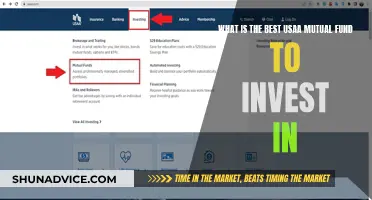
Investment funds are a way of investing money alongside other investors, pooling capital from multiple investors to purchase a portfolio of various securities, such as stocks, bonds, commodities, and other financial instruments. This collective investment strategy aims to benefit from reduced risks, access to professional investment managers, economies of scale, and increased asset diversification. The funds are managed by professionals who make investment decisions on behalf of the investors, and they can be open-ended or closed-ended, public or private, and actively or passively managed. While investment funds offer potential advantages, such as professional management and diversification, they also carry risks, including the potential for losses, market fluctuations, and high management fees.
| Characteristics | Values |
|---|---|
| Definition | A financial vehicle that pools money from multiple investors to purchase a portfolio of various securities, such as stocks and bonds |
| Purpose | To benefit from the inherent advantages of working as part of a group, such as reducing investment risk, accessing better investment opportunities, and obtaining greater management expertise |
| Management | Managed by a professional fund manager who makes investment decisions on behalf of the investors |
| Investment Decisions | Individual investors do not decide how the fund's assets are invested; they choose a fund based on its goals, risks, fees, and other factors |
| Types | Mutual funds, exchange-traded funds (ETFs), money market funds, hedge funds, and more |
| Open-End vs. Closed-End | Open-end funds issue new shares as investors add money, and retire shares as investors redeem; closed-end funds issue a fixed number of shares that are traded on an exchange |
| Fees | Ongoing management costs, transaction fees, and other one-off costs |
What You'll Learn

Investment fund types
Investment funds are financial products that pool capital from multiple investors to purchase a portfolio of various securities, such as stocks, bonds, and other financial instruments. They are managed by professional fund managers who make investment decisions on behalf of the investors. There are various types of investment funds, each with its own investment strategy, risk profile, and fees. Here are some of the common types of investment funds:
Mutual Funds
Mutual funds are investment vehicles that pool money from many investors to build a diversified portfolio of stocks, bonds, and other securities. They are professionally managed and diversified to spread risk and maximise returns. Mutual funds trade only once a day after the markets close and are designed for long-term investors. They are not meant to be traded frequently due to their fee structures. Investors receive the profits generated by the fund in the form of dividends and capital gains.
Exchange-Traded Funds (ETFs)
ETFs are similar to mutual funds in that they pool money from many investors. However, they trade like stocks on exchanges and can be bought and sold at any point during the trading day. ETFs offer diversification, often at lower costs than traditional mutual funds. They combine characteristics of both closed-end and open-end funds, providing the benefits of both.
Hedge Funds
Hedge funds are private, actively managed investment vehicles that employ more aggressive strategies to generate higher returns. They may use short selling, arbitrage, leverage, and derivatives to achieve their goals. Hedge funds are available only to accredited investors due to their high risk and complexity. They face less federal regulation than mutual funds or ETFs, allowing them to invest in a wider range of asset classes.
Money Market Funds
Money market funds invest in short-term fixed-income securities, such as high-quality, short-term debt instruments and cash equivalents. They aim to provide better returns than savings accounts while maintaining low risk. However, they are not insured by the FDIC.
Real Estate Investment Trusts (REITs)
REITs are investment funds that focus on investing in real estate rather than financial instruments. They are typically closed-ended funds, meaning they issue a limited number of shares that can be traded on a stock exchange.
Other Types of Funds
In addition to the above, there are various other types of investment funds, including foreign funds, bond and stock funds, absolute return funds, global funds, and more. These funds offer investors a range of options to choose from based on their risk tolerance, investment goals, and the types of assets they want to invest in.
Index Funds: When to Invest for Maximum Returns
You may want to see also

Investment fund advantages
Investment funds are a popular strategy for obtaining financial returns. They are a type of financial vehicle or collective investment scheme (CIS) that pools money from a group of individuals to invest in derivatives, fixed-income securities, shares, and other financial instruments.
Professional Management:
Investment funds provide access to professional investment managers who offer investment expertise and employ strategies to generate profits. These managers may offer better returns and more adequate risk management, enhancing overall investment performance.
Diversification and Reduced Risk:
By pooling money from multiple investors, funds can invest in a diverse range of assets, reducing unsystematic risk. This diversification spreads investment risk, ensuring that a single failed investment does not result in a total capital loss.
Economies of Scale:
Investment funds benefit from economies of scale, reducing transaction costs for individual investors. The collective nature of the fund allows investors to access a wider range of investment opportunities at a lower cost than if they were investing individually.
Liquidity:
Investment funds offer high liquidity, allowing investors to redeem their investments and receive their money back relatively quickly. This is in contrast to investing in physical assets like property, which can take months to liquidate.
Transparency and Regulation:
Investment funds are highly regulated and supervised by financial authorities, providing transparency and safeguarding investors' money. Additionally, funds are structured to keep investors' money separate from the fund's accounts, ensuring that assets remain under investors' ownership even if the fund goes bankrupt.
Tax Benefits:
In many jurisdictions, investment funds offer tax advantages, such as tax deferral on transfers between funds. This allows investors to take advantage of compound interest and maximize their returns.
While investment funds offer these benefits, it is important to remember that they also come with certain disadvantages, such as fees, potential management issues, and the possibility of losses. It is crucial for investors to carefully consider their financial goals, risk tolerance, and conduct thorough research before choosing an investment fund.
Smart Strategies for Choosing the Right Mutual Fund
You may want to see also

Investment fund disadvantages
Investment funds are a popular strategy for obtaining returns. They are a financial vehicle that pools money from a group of individuals to invest in derivatives, fixed-income securities, shares, and other financial instruments. They give people access to markets they would otherwise struggle to invest in, and they also help diversify investments.
However, there are some disadvantages to investment funds:
High Fees
Mutual funds, a type of investment fund, charge fees for their services. While some funds are passively managed, meaning they track an index and don't require experts to intervene, others are actively managed and therefore charge higher fees. Over time, even a fraction of 1% can mean that thousands of your dollars end up in someone else's pocket. Fees also reduce overall investment returns.
Tax Inefficiency
Due to turnover, redemptions, gains, and losses in security holdings throughout the year, investors in mutual funds typically receive distributions from the fund that are an uncontrollable tax event.
Poor Trade Execution
If you place your mutual fund trade anytime before the cut-off time for same-day net asset value (NAV), you'll receive the same closing price NAV for your buy or sell on the mutual fund. For investors looking for faster execution times, perhaps because of short investment horizons, day trading, or timing the market, mutual funds provide a weak execution strategy.
Management Abuse
Churning, turnover, and window dressing may happen if your fund manager is abusing their authority. This includes unnecessary trading, excessive replacement, and selling the losers prior to quarter-end to fix the books.
Lack of Control
Although the investor can choose the type of fund to invest in, they have no control over the choice of individual holdings that make up the fund.
Loss of Owner's Rights
If an investor holds shares directly, they have the right to attend the company's annual general meeting and vote on important matters. Investors in a collective investment vehicle often have none of the rights connected with individual investments within the fund.
TSP F Fund: A Smart Investment Move?
You may want to see also

Investment fund examples
Investment funds are a way of investing money with other investors to benefit from the advantages of working as a group. These advantages include being able to hire professional investment managers, achieving economies of scale, and increasing asset diversification to reduce unsystematic risk.
Mutual Funds
Mutual funds are a company that pools money from many investors and invests it in securities such as stocks, bonds, and short-term debt. The combined holdings of the mutual fund are known as its portfolio. Investors buy shares in mutual funds, and each share represents an investor's part ownership in the fund and the income it generates. Mutual funds are a popular choice among investors because they generally offer professional management, diversification, affordability, and liquidity.
Exchange-Traded Funds (ETFs)
ETFs are investment funds that combine characteristics of both closed-end and open-end funds. They are structured as open-end investment companies or unit investment trusts (UITs) and are traded on stock exchanges throughout the day. ETFs aim to keep their trading price close to the net asset value of their holdings through an arbitrage mechanism.
Money Market Funds
Money market funds invest in short-term, high-quality fixed-income securities, such as those issued by US corporations and governments. Due to the low-risk nature of these investments, money market funds are considered relatively safe.
Bond Funds
Bond funds typically aim for higher returns than money market funds by investing in various types of bonds. As a result, bond funds carry higher risks and offer more diverse rewards.
Stock Funds
Stock funds invest in corporate stocks and can be further categorised into growth funds, income funds, index funds, and sector funds. Growth funds focus on stocks with high financial gains potential, while income funds invest in stocks that pay regular dividends. Index funds track a specific market index, and sector funds specialise in a particular industry segment.
Hedge Funds
Hedge funds are actively managed investment funds available only through private placement. They face fewer regulations, allowing them to invest in various asset classes and employ a wide range of strategies. Hedge funds often invest in riskier assets, including derivatives, commodities, and alternative investments, in addition to stocks, bonds, and ETFs.
Real Estate Investment Trusts (REITs)
REITs are close-ended investment funds that primarily invest in real estate. They are structured as collective investment vehicles, unique bank-managed funds that combine assets from qualifying pension plans or trusts.
Everest Investment Funds: Is the Name Taken?
You may want to see also

How investment funds make money
Investment funds, also known as collective investment schemes, are a way of investing money alongside other investors. They are a financial vehicle that pools money from a group of individuals to invest in derivatives, fixed-income securities, shares, and other financial instruments.
There are various types of investment funds, including mutual funds, exchange-traded funds (ETFs), money market funds, and hedge funds. Each type of fund has its own unique characteristics and investment strategies.
Diversification and Risk Reduction:
Investment funds provide access to a diversified portfolio of investments, reducing the risk associated with individual investments. By pooling money from multiple investors, funds can invest in a broader range of assets, spreading the risk across multiple investments.
Professional Management:
Investment funds hire professional fund managers who are experts in the field. These managers make investment decisions, conduct research, and monitor the market to identify the best opportunities for generating profits. Their expertise can potentially lead to better returns and more effective risk management.
Economies of Scale:
By pooling money from numerous investors, investment funds can benefit from economies of scale. They can negotiate lower transaction costs, take advantage of dollar-cost averaging, and invest in certain assets or larger positions that may not be accessible to individual investors.
Types of Returns:
Investment funds can generate returns through various sources depending on their focus. These include dividend/interest income, portfolio distributions or capital gains from selling assets at a profit, and appreciation of fund shares over time.
Fees and Expenses:
Investment funds charge fees to their investors, which can include management fees, administrative costs, distribution fees, and other operating expenses. These fees are typically disclosed in the fund's prospectus and expressed as a percentage of the total amount invested.
It is important to note that while investment funds offer the potential for profitable returns, there are also risks involved. The value of investments can fluctuate, and poor investment decisions by fund managers can negatively impact returns. Therefore, it is essential for investors to carefully consider the risks, fees, and investment strategies before choosing an investment fund.
TSP Fund Choices: Navigating Your Investment Options
You may want to see also
Frequently asked questions
An investment fund is a financial product that pools capital from multiple investors to purchase a portfolio of securities, such as stocks, bonds, and other assets. The fund is then managed by a professional who makes investment decisions on behalf of the investors.
Investment funds offer several advantages, including access to professional management, increased diversification, and reduced investment risk. They also provide investors with a wider range of investment opportunities and lower fees than they could obtain on their own.
While investment funds can provide a level of diversification and risk reduction, they are not without risk. The value of the fund's shares can fluctuate with market changes, and there is always the potential for losses. Additionally, investment funds often charge management fees and transaction costs, which can impact overall returns.
When choosing an investment fund, it is important to consider your financial goals, risk tolerance, and the fund's objectives, strategy, performance history, and fee structure. It is also essential to understand the different types of investment funds available, such as mutual funds, exchange-traded funds (ETFs), and hedge funds, each with its own risks and rewards.
The process of investing in an investment fund will vary depending on the type of fund. It is recommended to speak with a financial advisor to understand the specific steps involved and to ensure the investment aligns with your financial goals and risk tolerance.







